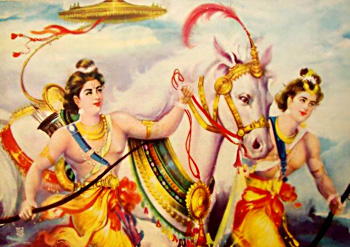 Lava and Kusha were the two sons of Rama and Sita who were born while Sita was staying in the hermitage of the great sage Valmiki. The birth of the two sons of Rama was described in the Uttara Kanda of Ramayana. While Rama ruled the kingdom of Ayodhya with peace and prosperity, Sita, dwelling at the hermitage of Valmiki` gave birth to two sons, and they were named Kusha and Lava. The two sons of Rama and Sita grew up in the forest hermitage, and Valmiki taught them wisdom, and made the great epic of Ramayana in shlokas, and gave them skill in recitation.
Lava and Kusha were the two sons of Rama and Sita who were born while Sita was staying in the hermitage of the great sage Valmiki. The birth of the two sons of Rama was described in the Uttara Kanda of Ramayana. While Rama ruled the kingdom of Ayodhya with peace and prosperity, Sita, dwelling at the hermitage of Valmiki` gave birth to two sons, and they were named Kusha and Lava. The two sons of Rama and Sita grew up in the forest hermitage, and Valmiki taught them wisdom, and made the great epic of Ramayana in shlokas, and gave them skill in recitation.
Horse Sacrifice of Lord RamaS
The reign of Rama over Ayodhya was peaceful and in those days Rama prepared a horse-sacrifice, setting free a jet-black horse with lucky marks to wander where it would, and Lakshmana followed it. Then he invited all the bears and monkeys, and Vibhishana and foreign kings, and the rishis and number of other hermits from far and near, to be present at the final ceremony. He gave away huge wealth throughout the year while the horse wandered, yet the treasure of Rama was in no way diminished; never before was such an Ashwamedha or Horse sacrifice in the world was held. Kusha and Lava came with the great rishi Valmiki to the ceremony, and Valmiki told them to recite the Ramayana everywhere, and if any questioned them, to name themselves as the disciples of Valmiki.
The two brothers went about and sang of the deeds of Rama; and Rama heard of it, and he called a great assembly of the Brahmins and all kinds of grammarians and artists and musicians, and the hermit children sang before them all. Wondrous and delightful was their song, and no one could hear enough of it; but all men drank up the children with their eyes, and murmured to themselves that the two brothers looked like Rama as one bubble is like another. When Rama tried to present them wealth, they answered that they were dwellers in the forest and they would not require money since it would be of no use to them. When they were asked about the composer of the verses, they answered that Valmiki composed them and that they were the disciples of the sage. The tow brothers also urged the king Rama that if he liked the story they he could here them during leisure.
So Lord Rama hearkened to the story day after day, and from it he came to know that Kusha and Lava were his sons, born from Sita. Then the elder son of Dasaratha mentioned the name of Sita before the assembly, and sent a messenger to inquire from the hermits if they would guarantee for her faithfulness and to ask herself if she were willing to give proof of her innocence again and to return to Ayodhya. The hermits sent back the message that she would come, and Rama was glad to get the news of Sita`s return. The next day, he appointed for the taking of the oath. When the appointed time had come, and all were seated in the assembly, immovable as mountains, Valmiki came forward, and Sita followed him with downcast glance and folded hands and falling tears; and there rose a cry of welcome and a murmuring in the assembly when they saw Sita following Valmiki, like the Veda following Lord Brahma.
Valmiki spoke before the people and told to Rama that Sita was pure and followed the path of righteousness, and he told the son of Dasaratha that he had renounced her close to his hermitage only because of the censure of the people of Ayodhya. Then he urged Rama to accept Sita and also told that since he followed the path of truth, guaranteed that the two children were the sons of Rama and he also promised before Rama that if any sin was found in Sita then he would forgo the fruit of all austerities which he had practiced for many thousand years. Then Rama, seeing Sita standing before the assembly like a goddess, with folded hands, told her that she was ever virtuous, and also told that the words of Valmiki convinced him of the purity of Sita. He also told that he had recognized that the brothers Kusha and Lava were his sons. However, Sita was required to give testimony herself, for the sake of those that were present there to witness her avowal.












